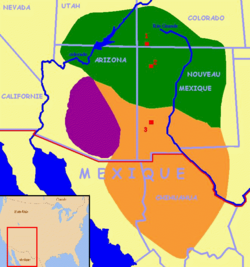Crow Canyon Archaeological Center facts for kids
Quick facts for kids Crow Canyon Archaeological Center |
|
|---|---|

Location of the archaeological center (point 1 near the Rio Grande) within Anasazi territory (green area) in Colorado
|
|
| Location | |
|
,
United States
|
|
| Coordinates | 37°21′16″N 108°37′13″W / 37.354454°N 108.620416°W |
| Information | |
| Founded | 1974 |
| Founder | Dr. Edward Berger |
| Category | Archaeology teaching and research center |
| President | Elizabeth (Liz) Perry, PhD |
The Crow Canyon Archaeological Center is a special place in southwestern Colorado, USA. It's like a huge outdoor classroom and research center. Here, students and adults can learn about archaeology through hands-on activities.
The center focuses on the history of the Ancient Pueblo peoples. These people lived in places like the cliff dwellings of Mesa Verde National Park over 700 years ago. Crow Canyon helps preserve their history and teaches people about their amazing past.
Contents
Discovering Ancient History: How Crow Canyon Started
The idea for Crow Canyon began in 1967 with Edward F. Berger. He was a history teacher in Colorado. Mr. Berger wanted to help students learn by doing. He brought them to southwestern Colorado to experience history firsthand.
Archaeology became a big part of their learning. Students worked with real archaeologists. They helped dig at ancient Pueblo sites. This was a new way to teach and learn about history.
In 1972, Mr. Berger started a non-profit group. This group would later become Crow Canyon. He bought 80 acres of land near Cortez, Colorado, in 1974. He wanted to create a year-round campus for learning.
From 1975 to 1986, Mr. Berger and his wife, Joanne, worked hard. They developed new ways to teach archaeology quickly and effectively. Students could go from knowing nothing to working with experts in just two days!
The center grew and became well-known. They worked closely with the Ute Mountain Ute Tribe. This helped create special programs and strong friendships. Many ancient sites were found and named by students.
In 1983, Crow Canyon joined with another group. This helped them get more money and build better facilities. A new lodge was built for students. More archaeologists were hired. They began research at important sites like Sand Canyon Pueblo.
In 1986, the Bergers left their leadership roles. They had built a strong foundation for Crow Canyon. Their unique learning model continues to guide the center today.
What Happens at Crow Canyon Today?
Crow Canyon's main goal is to protect the rich history of the Ancient Pueblo Indians. They also teach people why it's important to preserve archaeological sites.
You can learn archaeology by doing it yourself. Students and teachers can join in research at the archaeological camp. It's a chance to learn, explore, and have fun!
Awards and Special Recognition
Crow Canyon has received many awards for its work. These awards recognize their efforts in education and preserving history.
- 2010: Society for American Archaeology Film Fest award for "Visit With Respect."
- 2008: National Trust for Historic Preservation's National Preservation Honor Award.
- 2008: Colorado Historical Society's Caroline Bancroft History Award for "Visit with Respect."
- 2006: Colorado Historical Society's Caroline Bancroft History Award for "Making History."
- 2006: Colorado Preservation, Inc., State Honor Award for "Ancient Images, Pueblo Perspectives."
- 2003: Colorado Historical Society's Stephen H. Hart Award for Leadership in Education.
- 1999: Society for American Archaeology's Award for Excellence in Public Education.
- 1992: President's Historic Preservation Award.
Exploring Ancient Homes: Excavation Sites
Crow Canyon Archaeological Center has several important excavation sites. These sites are used for ongoing study and learning programs.
| Site name | Location | Type | Description | Photo |
|---|---|---|---|---|
| Albert Porter Pueblo (also called Hedrick Ruin) | Yellow Jacket, Montezuma, Colorado | Great house | Large Pueblo ruins from AD 1000 to 1300. It is listed on the National Register of Historic Places. | |
| Castle Rock pueblo | Great house | Ruins in southwestern Colorado. It has at least 16 kivas (underground ceremonial rooms), 40 surface rooms, and nine possible towers. | ||
| Shields pueblo | Ruins in southwestern Colorado. | |||
| Woods Canyon Pueblo | Yellow Jacket, Montezuma, Colorado | Great house | Pueblo ruins from AD 1000 to 1300. It may have up to 200 rooms, 50 kivas, and 16 towers. It is listed on the National Register of Historic Places. | |
| Yellow Jacket pueblo | Yellow Jacket, Montezuma, Colorado | Great house | Mesa Verde culture ruins from AD 1000 to 1300. This large pueblo covers 100 acres. It has at least 195 kivas, 19 towers, and up to 1,200 surface rooms. It is listed on the National Register of Historic Places. |
 | Delilah Pierce |
 | Gordon Parks |
 | Augusta Savage |
 | Charles Ethan Porter |

